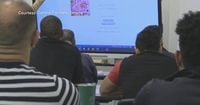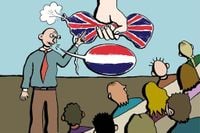In a significant shift that has left many educators and students disheartened, the Alberta government has announced the cancellation of English language programs across the province due to federal funding cuts. The decision, which affects a wide range of educational institutions, is part of a broader strategy to reduce the number of international students in Canada, a move that has raised concerns about the future of English language education and its impact on cultural exchange.
Published on March 28, 2025, the news has sparked a wave of sadness among program directors and students alike, as the cuts threaten not only the availability of English language instruction but also the diverse cultural interactions that come with it. The ripple effects of these cancellations extend beyond the classroom, potentially impacting Alberta's economy and its reputation as a welcoming destination for international students.
According to various reports, the Alberta government's decision aligns with a national trend where authorities are looking to limit the influx of international students. This approach is encapsulated in the Internationalisation in Balance Act (Wib), which proposes a 'language test' to evaluate educational programs based on criteria set by the minister. While the intent is to streamline educational offerings, the consequences of such measures could be dire for many institutions.
Koen van Eijck, the program director for the International Bachelor Arts & Culture Studies (IBACS), expressed deep concern over the potential loss of English language instruction. "Without international students, we would find ourselves in significant financial trouble. About two-thirds of our staff are non-Dutch, and the cultural richness that comes from having a diverse student body is invaluable," he noted. Established in 2014, IBACS has around 100-120 students each year, with about half being international. The program has thrived on the inclusion of different perspectives, which enriches the learning environment.
Similarly, Marjan Gorgievski, who oversees the International Bachelor Psychology program, highlighted the societal benefits of international students. "They often stay and work in the Netherlands after their studies, contributing significantly to our economy. Research indicates that European students contribute an average of €17,000 to society, while non-European students contribute about €96,000," she stated. This program, also established in 2014, enrolls approximately 600 students annually, with a significant portion being international.
The International Bachelor History (IBH) program, directed by Maarten van Dijck, has also faced uncertainty due to the proposed cuts. Established in 2015, IBH has around 120 students, with approximately 45 being international. Van Dijck noted that the transition to English was relatively smooth for most staff and that the quality of education has improved through the inclusion of diverse viewpoints. "In history, multiperspectivity is crucial. Having students from different backgrounds allows for a richer understanding of historical events," he explained.
As the Wib approaches, program directors are preparing to answer questions regarding the language test and its implications. There is a palpable sense of anxiety among faculty members, many of whom are considering taking Dutch language courses in anticipation of potential changes. Gorgievski mentioned that some staff members are already proficient in Dutch, but the shift could lead to a restructuring of teaching responsibilities to accommodate the new requirements.
"We have already held meetings where staff could express their concerns and expectations. International colleagues have questioned why we are not more proactive in responding to these political developments," said Gorgievski. This sentiment reflects a growing frustration within the academic community regarding the government's approach to international education.
Van Eijck emphasized the importance of maintaining English language programs, arguing that they are essential for the quality of education and the financial viability of their institutions. "It's not just about language; it's about the cosmopolitan perspective that students gain through exposure to different cultures," he remarked. He also expressed skepticism about the government's ability to justify the financial benefits of cutting English programs, asking, "Who tells me it will be cheaper if we abolish the English variant?"
As discussions about the future of English language education continue, the potential loss of such programs raises critical questions about the value of cultural diversity in education. With international collaboration becoming increasingly important in today's interconnected world, the implications of these cuts could be felt far beyond the classroom.
In light of these developments, educators and students alike are calling for a reevaluation of the government's approach to international education. The need for a balanced strategy that supports both the financial sustainability of educational programs and the cultural enrichment that comes from a diverse student body is more pressing than ever.
Ultimately, the fate of English language programs in Alberta will depend on the government's willingness to reconsider its stance on international students and the value they bring to the educational landscape. As the situation unfolds, many are left wondering whether the province will prioritize the long-term benefits of cultural exchange and global understanding over short-term budgetary concerns.






